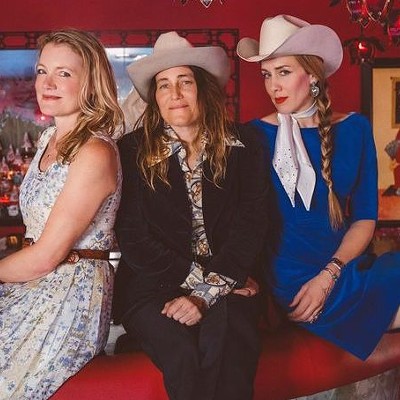With the current dearth of honky-tonk dance bands in a town that once probably had as many full-time, tear-ass dance bands as any city in the nation, it’s hard to imagine that not long ago giants roamed the streets and, more importantly, the stages, of the Bayou City. One artist – and character – who stood tall in Houston was guitarist, songwriter, promoter and entrepreneur Jerry Irby.
Irby, whose biggest claim to fame is as the writer of honky-tonk standard “Drivin’ Nails In My Coffin,” was born in Sabine County in 1917. By 1936 he was living in Houston, working in a duo with local big dog Ted Daffan, who wrote the Ray Charles hit “Born to Lose,” and playing guitar with the Bar X Cowboys, described in the Handbook of Texas Music as a “top-notch Houston group.”
By most accounts, Irby was a happy-go-lucky kind of guy, a good-time prankster who enjoyed his wine, women and song. According to some, this caused strain between Irby and his more “upright” family members and was a source of sadness for Irby, who would later get religion and cut some gospel sides in the late '70s.
Ironically, for all his public appearances and success, the life of Jerry Irby is hard to piece together. His entry in the Handbook of Texas Music glaringly conflicts with the unattributed biography at the allmusic.com site, where Irby is described as being raised by a rich grandmother who supported some of his business forays.
After a decade in the Houston club scene, Irby finally hit his grand slam when he wrote “Nails in My Coffin” in 1946. Not only did the tune become a regional hit for the already-popular Irby, it was quickly recorded by Floyd Tillman, a local star with a national following, and the Texas Troubador himself, Ernest Tubb. Tillman’s version peaked at No. 2 on the country charts and Tubb’s reached No. 5, making 1946 a very lucrative year for Irby. However, like many musicians, Irby had the bad luck to be in his prime during the dark days of World War II when a recording ban was in effect to conserve war materials. In fact, Irby endured two recording bans, from 1942-44 and again in 1947.
The national success of the tune brought Irby a contract with MGM, the label about to sign young Hiram “Hank” Williams. Irby recorded a few stellar sides for MGM before another recording ban in 1947 derailed his national aspirations. Irby’s MGM side “Hillbilly Boogie” is another showpiece for his top-flight band, and “Ball and Chain” is another solid two-stepper right in any dancer‘s wheelhouse.
Irby subsequently recorded for numerous labels in including Imperial and Ted Daffan’s label, Daffan Records,
As distant Irby relative Bill Blackmon, drummer for legendary Austin punk band The Skunks, noted, Irby’s output was uneven, probably depending on how much money was available at various sessions. And while Irby had hit honky-tonk gold with “Nails In My Coffin,” many of his lyrics were trite and formulaic. Be that as it may, he was a very popular entertainer in southeast Texas into the early 1950s, as numerous newspaper advertisements for his appearances prove.
Irby often played the poor boy, but according to Allmusic he grew up under the wing of his wealthy grandmother in the New Braunfels area. Whatever his situation, Irby (likely with support from his grandmother) moved into the club business after his windfall years of 1946-47, opening Jerry Irby’s Texas Corral, a 1,000-seat club at the intersection of Old Spanish Trail and South Main. His band held the fort down three nights a week, with the other nights split between Floyd Tillman and Leon Payne, giving the Corral one of the stoutest week-in, week-out honky-tonk rotations in the country.
Irby died December 23, 1983 in Gray Hawk, Ky.
Support Us
Houston's independent source of
local news and culture
account
- Welcome,
Insider - Login
- My Account
- My Newsletters
- Contribute
- Contact Us
- Sign out
[
{
"name": "Related Stories / Support Us Combo",
"component": "11591218",
"insertPoint": "4",
"requiredCountToDisplay": "4"
},{
"name": "Air - Billboard - Inline Content",
"component": "11591214",
"insertPoint": "2/3",
"requiredCountToDisplay": "7"
},{
"name": "R1 - Beta - Mobile Only",
"component": "12287027",
"insertPoint": "8",
"requiredCountToDisplay": "8"
},{
"name": "Air - MediumRectangle - Inline Content - Mobile Display Size 2",
"component": "11591215",
"insertPoint": "12",
"requiredCountToDisplay": "12"
},{
"name": "Air - MediumRectangle - Inline Content - Mobile Display Size 2",
"component": "11591215",
"insertPoint": "4th",
"startingPoint": "16",
"requiredCountToDisplay": "12"
}
,{
"name": "RevContent - In Article",
"component": "12527128",
"insertPoint": "3/5",
"requiredCountToDisplay": "5"
}
]
KEEP THE HOUSTON PRESS FREE...
Since we started the Houston Press, it has been defined as the free, independent voice of Houston, and we'd like to keep it that way. With local media under siege, it's more important than ever for us to rally support behind funding our local journalism. You can help by participating in our "I Support" program, allowing us to keep offering readers access to our incisive coverage of local news, food and culture with no paywalls.
William Michael Smith
Trending Music
- Legendary Bluesman Goes Rogue on New Album
- Top 10 Butt-Rock Bands of All Time
- Is Pink Floyd's A Momentary Lapse of Reason Misunderstood or Just Bad?
-
Sponsored Content From: [%sponsoredBy%]
[%title%]

Don't Miss Out
SIGN UP for the latest
Music
news, free stuff and more!
Become a member to support the independent voice of Houston
and help keep the future of the Houston Press FREE
Use of this website constitutes acceptance of our
terms of use,
our cookies policy, and our
privacy policy
The Houston Press may earn a portion of sales from products & services purchased through links on our site from our
affiliate partners.
©2024
Houston Press, LP. All rights reserved.




